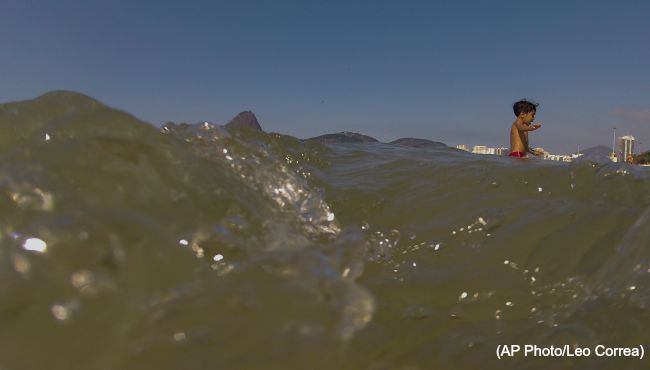-
Tips for becoming a good boxer - November 6, 2020
-
7 expert tips for making your hens night a memorable one - November 6, 2020
-
5 reasons to host your Christmas party on a cruise boat - November 6, 2020
-
What to do when you’re charged with a crime - November 6, 2020
-
Should you get one or multiple dogs? Here’s all you need to know - November 3, 2020
-
A Guide: How to Build Your Very Own Magic Mirror - February 14, 2019
-
Our Top Inspirational Baseball Stars - November 24, 2018
-
Five Tech Tools That Will Help You Turn Your Blog into a Business - November 24, 2018
-
How to Indulge on Vacation without Expanding Your Waist - November 9, 2018
-
5 Strategies for Businesses to Appeal to Today’s Increasingly Mobile-Crazed Customers - November 9, 2018
Olympic water in Rio may be ‘unfit’ for athletes
Paratriathlete stands on the shore of the Copacabana Beach during a training session, in Rio de Janeiro, Brazil, Friday, July 31, 2015.
Advertisement
The most recent pollution reading was taken from a sample this past Monday. An Olympic qualifier and Paratriathlon event begins Saturday, and several athletes were already getting into the water Friday morning.
Officials publicly insisted athletes were safe and stuck to the competition schedule.
WHO didn’t respond to repeated emailed and phoned requests for comment.
AP analysis of water quality revealed dangerously high levels of viruses and bacteria from human sewage in Olympic and Paralympic venues.
The water is so contaminated that in some places the levels of disease-causing viruses is up to 1.7 million times higher than the level that would be considered unsafe for a SoCal beach.
More than 10,000 athletes from 205 nations are expected to compete in next year’s Olympics.
“The information we have is that it’s safe to swim”, said Amanda Duke, team manager for the U.S. paratriathlon team.
Mario Moscatelli, a biologist who has spent 20 years lobbying for a cleanup of Rio’s waterways, said the state environmental agency was trying to divert attention from the serious pollution problem affecting water. Brazil government tests only for bacteria levels.
Adams, however, explained that US Sailing has been working with the United States Olympic Committee to conduct its own tests on the water quality of Guanabara Bay, and they’ve found the results satisfactory. “The outcome of the testing has met the standards”. We’ve gained valuable experience there and we’ll continue to monitor the situation and continue to encourage all efforts to clean up the bay.
However, sailors and rowers who have sailed in the Olympic waters said they were not concerned.
“The fluctuation depends on the tide”. The tests concluded that athletes risk exposure to viruses that could make them too ill to compete. ISAF hopes that the power of the Olympic Games will provide a great legacy as Rio de Janeiro works to improve the state of the bay generally.
The Brazilian Intelligence Agency will also set up in the Olympic city a center dedicated to combat terrorism, where it will receive the help of intelligence agents from numerous countries.
In this April 28, 2015 photo, Fernando Spilki, virologist and…
“For years now we’ve seen the flow of raw sewage, which contains fecal coliforms and other bacteria, viruses, protozoa and an infinite number of pathogenic microorganisms that can cause everything from ringworm to hepatitis”, Moscatelli said.
“If I were going to be in the Olympics I would probably go early and get exposed and build up my immunity system to these viruses before I had to compete, because I don’t see how they’re going to solve this sewage problem”.
Advertisement
So that sounds good, but its just a matter of those pesky viruses.





























